After over a decade of supporting enterprise clients in their search engine optimization efforts, I’ve had the opportunity to interface with many procurement professionals across all categories. Recently, it dawned on me that these wonderful folks often don’t have much of an understanding of what it is we do or why any given company may be better at it than another. Much of our work in this space is educational, so we figured that it would be good to give a high-level overview of SEO that would clarify its value and where it plugs into an enterprise organization.
Please understand that this overview is quite opinionated and reflective of the things that we’ve done to drive over a billion dollars in incremental revenue via Organic Search across our client portfolio. As you might imagine, I’m certainly not going to shy away from suggesting that we may be the right fit for your enterprise SEO needs. However, I intend to clarify the lay of the land on the way there.
First, What is SEO?
Search Engine Optimization, or SEO, is a marketing activity wherein websites are altered to generate more visibility for their content within search engines from the Organic Search channel. In other words, people don’t naturally build their websites and content in such a way that it automatically ranks in Google; search engines need a little help. We augment content as well as the site’s technical structure and configuration to bring it to the top of Google with the goal of driving a higher quantity and quality of traffic.
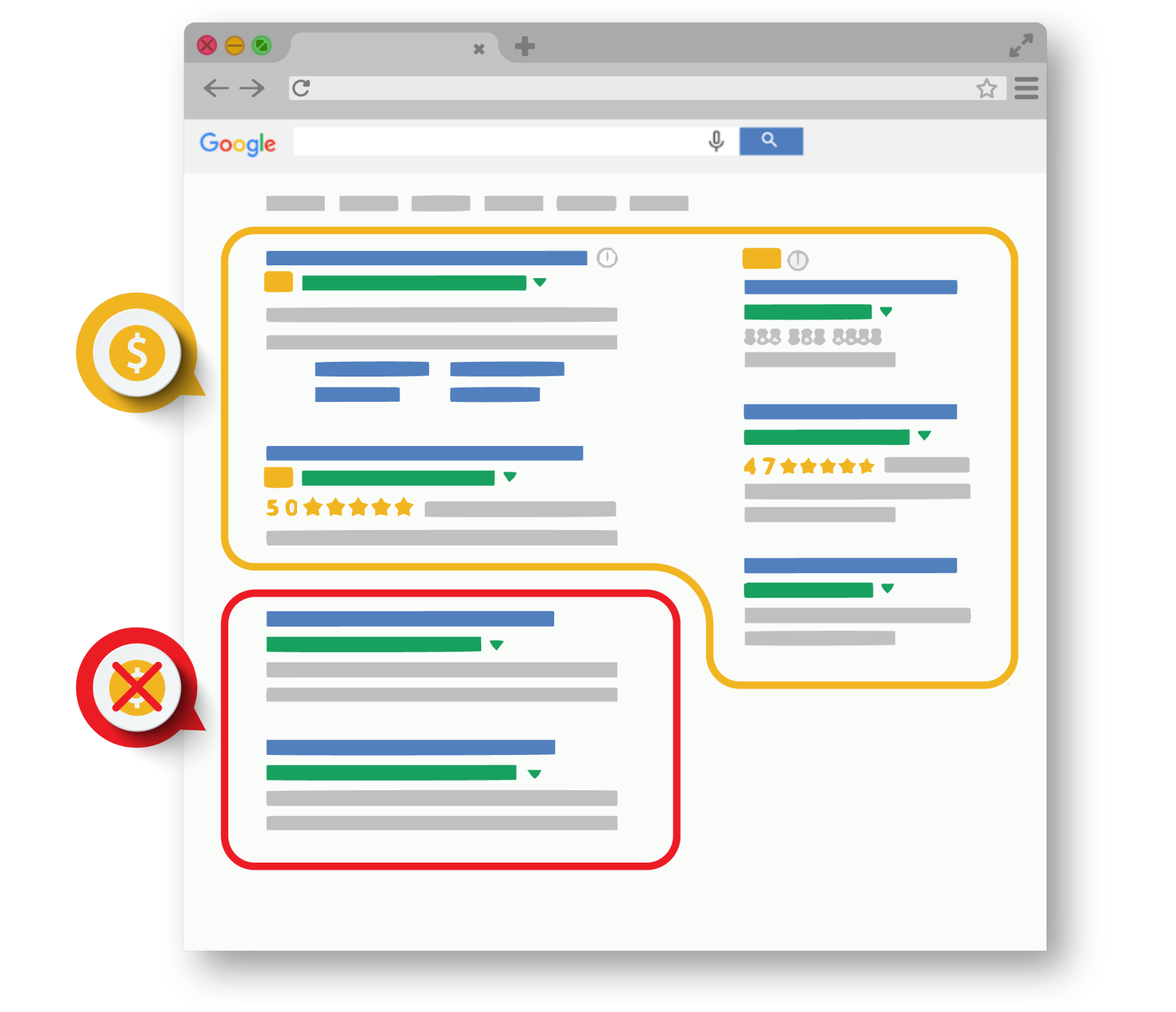
This is explicitly different from the media side of Search, Paid Search, or SEM, wherein advertisers select keywords and bid in an auction on the placements of their content in search engines. In the image above representing a search engine results page (SERP), the top and right areas represent Paid Search, the rest is Organic. It’s generally accepted that 10% of searchers click the ads, and 90% of searchers click the Organic listings.
Notably, Google is far and away the largest search engine. Depending on whose stats you go by, the chasm between them and the next search engine is quite large. So, unless there is a specific use case or an international need for a country-specific search engine like Baidu (China) or Yandex (Russia) SEOs focus on optimizing for Google.
In practice, everything in SEO is done with respect to the relationship of a keyword to a webpage. While there are many advanced approaches that may involve data science and machine learning capabilities, the core efforts are generally segmented into five buckets:
- Market Research
- What is it? Typically this involves identifying keywords that people are searching for that align with business objectives and reviewing competitors to determine what it is that they are doing to be effective. Google and the SEO industry provide a variety of tools and datasets that allow us to get visibility into this information and explain it through the lens of a client’s need.
- What teams does it interface with? SEO firms are usually dealing with marketing, strategy, or brand teams for this work.
- What SEO Staff Does This? Data Analysts and SEO Managers
- Technical
- What is it? The technical aspects of SEO involve the “under the hood” components of the website. SEOs alter various configurations of the front-end code, content management system, server, and content delivery mechanisms to ensure the site is accessible to search engine robots. Google and the SEO industry provide a variety of tools for examining the website in the way that search engines experience it to determine what these issues are.
- What teams does it interface with? This work is usually done by interfacing with internal or external engineering teams that manage the site and its operations.
- What SEO Staff Does This? SEO Managers, SEO Engineers, and Technical SEO Analysts
- Content
- What is it? Developing content strategy, optimizing existing content, and creating net new content in support of the growth of the keyword universe in alignment with business objectives and attraction of inbound or external links.
- What teams does it interface with? Many teams tend to have a hand in content, so it may involve interfacing with brand, content, strategy, compliance, media, public relations, newsroom, or teams by any number of other names.
- What SEO Staff Does This? SEO Managers and Content Strategists
- Off-Page
- What is it? Building external links to the content and examining any previously built and attracted links that may yield penalties or demotions in Google’s search results. When doing SEO, this is the area where the most risk lies because Google actively polices the links across the web and may demote or remove sites from its rankings for not adhering to its guidelines. Many enterprise companies avoid link-building as a result.
- What teams does it interface with? This is generally done by interfacing with brand, media, public relations, partnership, and internal SEO teams.
- What SEO Staff Does This? SEO Managers or Content Strategists do the strategy work. SEO Coordinators or Outreach Specialists do the outreach.
- Reporting
- What is it? As with any digital marketing channel, SEOs report on the impact of their efforts on the channel and ultimately the business. In the enterprise context, it is often difficult to prepare business intelligence-level reporting because legal compliance issues don’t allow external partners the correct level of access. External partners are often left to determine creative ways to report on channel metrics to indicate business value of the effort.
- What teams does it interface with? All teams tend to have a vested interest in the reporting of the SEO program.
- What SEO Staff Does This? Account Manager, Data Analyst, SEO Manager, or SEO Engineer
How is SEO done?
I suspect any agency that you speak to will have some sort of wheel that shows the process of how they do SEO. These frameworks are a great way to communicate the cyclical process of optimization, but can often be thrown out the window based on the needs and makeup of a business.
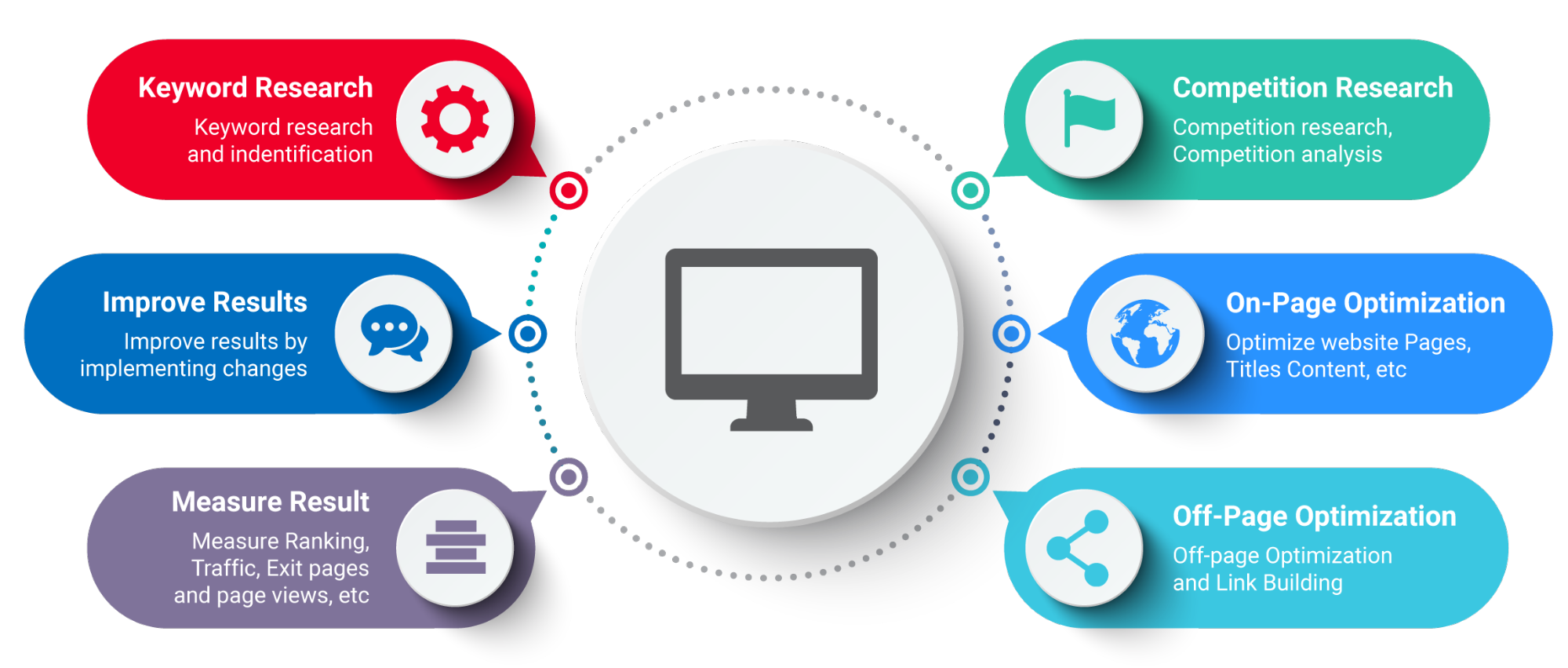
Many SEO firms limit their work to these items, but this oversimplifies how SEO is done in the enterprise since implementing these tactics requires cross-functional alignment.
This is why it is often difficult to make SEO happen. So, the best way to explain it is to break down a specific workflow. Consider a situation wherein a page’s content is to be optimized, but the site is composed of a variety of different systems tied together. In this instance, the page is not on a content management system, rather it is a legacy page that needs engineering resources to edit.
- Request/Brief from client or Identification by the SEO
- Keyword Research
- Competitive Research
- Content Optimization
- Brand/Line of Business Review
- Legal compliance Review
- Technical Requirements Scoping
- Ticket Generation
- Code Editing
- Code Testing
- Code Deployment
- SEO Implementation Review
Even without going into more depth as to what these steps represent, it is easy to see that a simple SEO implementation can go back and forth between various people in the SEO firm, the business unit, legal, and engineering multiple times before it gets deployed.
What is required to get SEO results in the enterprise?
A site has an enterprise SEO need for one of two reasons. Either the site is large and complex or the organization is large and complex. In either case, the implementations are all about scalability and navigating an organization with many competing needs, priorities, and time-consuming processes. This requires that an SEO firm have a level of executive sophistication to continually drive results.
What about niche-specificity?
It’s important to note that a niche-specific SEO agency does not inherently yield better outcomes. They will certainly already know your industry’s terminology and may be better prepared to generate content for your space, but a strong SEO agency should be able to uncover these elements and acclimate quickly as part of their discovery and strategy processes.
Your company’s transferable knowledge is more than enough to get a great SEO agency up to speed and productive quickly.
Why is it difficult to find a good SEO agency?
It’s difficult for the same reasons that SEO itself is difficult. SEO is an unregulated industry; there are no official standards and no rules aside from Google’s own Search Essentials.
There’s no governing body. It’s an industry built on top of a series of proprietary algorithms that are increasingly complex and nuanced. Methodologies that worked yesterday may not work today, so experience can be both an asset and a liability.
Google has also continually eroded the keyword-level performance data, so SEO doesn’t have the level of measurability that paid channels have. As such the landscape allows for a lot of opinions and not a lot of definitive answers.
What types of companies do this work?
Lots of companies say they do this work. Depending on your specific use case, one type of company may be a better fit for your organization. Here’s an overview of who we often compete with:
- Network/Holding Company Agencies – Brands are often after a global footprint or the consolidation of a variety of marketing services, so holding company agencies will often offer SEO as a service. As a previous employee of two holding company agencies, I can tell you that SEO is not a profit center for these organizations and it’s the last thing that someone on a media or creative team wants to integrate into their work. In most cases, holding company agencies sell it as part of the bundle and don’t staff it correctly. This is not true of every holding company agency as there are a handful that do build complete SEO teams. However, it is rare for SEO in these organizations to get access to robust tooling, capitalize on innovation, or be staffed effectively to deliver on all components of SEO such as link building. For the most part, these organizations are good at delivering polished reports and documents based on safe thinking, but they often struggle at generating results, especially in highly competitive spaces.
- Big Consultancies – Some people like to make the distinction between holding company agencies (Publicis, WPP, Omnicom) and the big consultancies (Deloitte, Accenture, etc.). The latter has made a strong push into digital channels as of late. We have not come against them in competition yet, but I’ve heard of these organizations making a play for media engagements as well. For the purposes of this discussion, I will treat these organizations interchangeably.
- Big Consultancies – Some people like to make the distinction between holding company agencies (Publicis, WPP, Omnicom) and the big consultancies (Deloitte, Accenture, etc.). The latter has made a strong push into digital channels as of late. We have not come against them in competition yet, but I’ve heard of these organizations making a play for media engagements as well. For the purposes of this discussion, I will treat these organizations interchangeably.
- Boutique SEO Agencies – Agencies that focus exclusively or almost exclusively on Organic Search. These organizations tend to have deeply focused teams that are built around this capability. Boutiques tend to be the best suited to delivering actual results rather than just delivering reports. However, these organizations tend to be deficient in creative execution and account management. Oftentimes, these types of organizations believe the account management layer is superfluous and it makes it difficult for enterprise clients to get the level of service that they are accustomed to.
- SEO Software companies – Enterprise SEO software companies not only provide automated solutions for monitoring SEO performance and identifying issues with websites. They understand that knowing issues is not enough to drive results, so these organizations often build professional services teams of former agency employees. While the software itself may always be the right fit for a brand, the services organizations at these companies are often not the right fit if a brand has difficulty with content creation, deployment, link building under-established workflows and/or cross-channel optimization.
So, where does iPullRank fit?
We are a boutique SEO agency with features of both holding company agencies and SEO software companies. I say this because, as the founder, I’ve baked everything I learned about strategy, relationship management, polished deliverables, and thorough analysis from working at ad agencies into what we do. Also, due to my Computer Science background and proclivity for all things technical, we also build customized software solutions and integrate them with best-in-class SEO software and datasets to solve our clients’ problems. I like to think we are on our way to being a big boutique agency.
What should procurement professionals look for in a strong SEO agency?
It is certainly not my place to determine the needs of an organization sight (or maybe site) unseen. Naturally, the procurement professional knows far more than I may ever know about their organization. However, I had been employed at five different agencies (2 holding companies, 3 boutiques) before I started my own and I have competed and won clients against dozens. What follows is a series of aspects that tend to resonate with enterprise organizations:
- Results-driven – Organizations hire agencies to achieve a specific result. Some agencies are better for showing activity since the standard time and materials billing model rewards that. Other agencies are focused on specific deliverables and/or outcomes.
- Agility – Business objectives and environmental factors. Enterprise companies often need a group that moves faster than they can. An effective SEO agency needs to be able to quickly pivot and adapt.
- Ability to effectively prioritize recommendations – There are often a wealth of issues that are impeding Organic Search visibility on an enterprise website. An agency needs to be able to identify business impact and develop business cases to drive buy-in for execution.
- Ability to Stay on top of Google’s Rate of Change – Google makes algorithm updates every single day. Some are minor and unreported, others are major shifts in how they are examining and ranking web pages. An agency needs to stay up to date and continually present POVs to help contextualize opportunities for the enterprise.
- Strong understanding of SEO technologies – While the SEO software industry struggles to keep pace with Google, the community rapidly rolls out open-source tooling to help close the gap. The ideal SEO firm is actively monitoring and capitalizing on these innovations.
- Content/Creative capabilities – Historically, SEO has been guilty of generating poorly-written, keyword-laden content in support of attracting search engine robots. Since Google’s Panda algorithm update in 2011, that method is no longer effective. SEO firms have to have content and creative abilities similar to that of a Creative agency. The ideal SEO firm has a strong handle on content strategy and content marketing.
- Ability to Fit into the Marketing Mix – Since SEO often requires sites and pages to follow specific structures, it has historically been a disruption to the marketing mix. The ideal SEO partner for the enterprise understands when to push and pull and how to acclimate recommendations to achieve the most harmony within the marketing mix.
- Ability to Weigh UX in Decisions – SEO generally requires content to be more text-heavy than design teams would prefer. As such, SEO teams need to have a strong understanding of how to balance the user experience with the need to pepper pages with content and links.
- Ability to Interface with Development Teams – Enterprise SEO is largely about developing scalable solutions. Most of the scale is achieved through technical implementation. However, there is often a gulf between an SEO’s ability to identify a problem and their ability to communicate the solution to an engineer. The ideal SEO firm has the ability to deliver recommendations with the same precision as a product manager.
- Innovation and Thought Leadership – The digital space is in constant flux which yields a lot of pockets of opportunity. Due to the nature of chasing algorithms, SEOs are known for their ingenuity and creative solutions. There is a wealth of people in the SEO community who are constantly challenging the status quo and identifying innovations at the intersections of media, machine learning, and SEO. You won’t find these people at holding companies.
- Deep Understanding of the Web – The Web is a highly technical environment with underpinnings that have a direct impact on the performance of a website in Organic Search. The people layer of the web is also built on 25 years of shared cultural experience that should inform content. SEOs need deep knowledge of both layers in order to be successful.
- Strong Data Capabilities – From terabytes of server logs to telemetry extracted from pages to standard analytics, SEOs manage a wealth of data and require strong data mining skills in order to identify and report on pockets of opportunity.
- Strong account management capabilities – Enterprise companies have a service level expectation that includes a layer of relationship management. Smaller organizations, both supplier and client-side, do not believe in the value of this layer of account management. This is a mistake when dealing with large organizations. In an SEO organization, the Account Manager is perhaps the most important team member in that they are continually working on both sides of the equation to ensure that all parties are maintaining alignment with each other and the business objectives. This is a non-negotiable requirement for the enterprise.
- Ability to build site authority through white hat methods – Building links is difficult due to Google’s requirements and it’s even harder due to the legal limitations of enterprise companies. Only boutique SEO firms truly have the staffing and creativity to navigate this component of the work. Holding companies always outsource it.
How do these types of companies stack up?
Again, this is just my opinion based on 14 years in the SEO industry and working at five agencies. The strength breakdown is as follows:
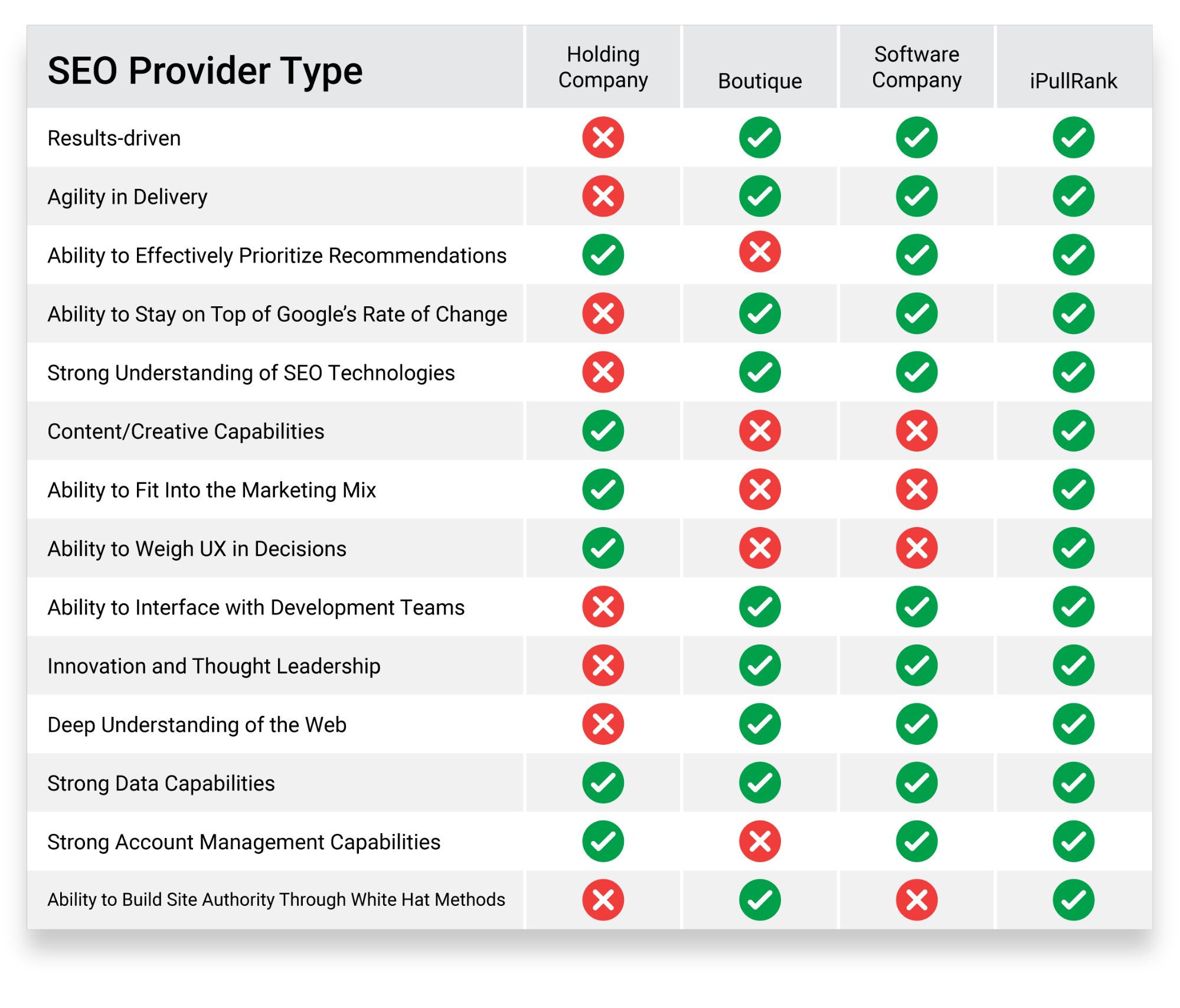
In short, you should hire a holding company to do your SEO when you want to get a good deal as part of a bigger ask, check the SEO box, but only if/when results are not a critical measure of the program. Hire a boutique firm when results are the primary need. Hire a software company when your internal SEO team is already strong and you just need to supplement their busy work. Hire iPullRank when you want the best of all things.
What are common misconceptions that enterprise companies have about SEO?
- We Should Automatically Rank Because We’re ________ – According to Google, their Organic Search algorithm is powered by various complex systems that are weighted by an unknown number of ranking factors. While the strength of a brand in the real world may be reflected in some of those factors, a brand does not inherently rank in Google just because it exists.
- Our Category Competitors Are Our SEO Competitors – Maybe, but probably not. For example, if you’re Target, your category competitor is Wal-Mart offline. Online your main competitor is Amazon. If you’re Delta, your category competitor offline is American Airlines. In Organic Search your competitor is TripAdvisor. Suffice it to say, you are competing with content brands that have stronger online footprints and have more latitude to execute.
- SEO is a One-Time Thing – Even if you achieve number one rankings today, Google may make a change and your competitor does not stop optimizing. SEO requires a continuous effort to be effective long term.
- SEO is Just Technical – SEO is improving the visibility of content. The technical aspects are combined with strategic content and outreach execution to drive results. You cannot do SEO effectively without aligning it with a content effort.
- SEO Traffic is Free – Organic Search as a channel is only as free as the site you build, content you put onto it, and the authority you build to that content through links. Effectively, the cost of SEO is a function of the efforts that went into it. It is certainly not the same as a Paid Media channel where you are directly purchasing an impression or click, but it is not free.
- It Takes Six Months to See SEO Results – This may have been true 15 years ago when Google was a younger company with less computing power at its disposal. However, it is completely untrue in 2024. Google does not take six months to react to the changes that a website makes. Rather, it generally takes six months for an enterprise company to deploy enough changes to see a result.
- You have to make “SEO Content” – In 2011, Google launched the Panda algorithm update which demoted and devalued content that did not have utility for actual users. Since then SEO has had to realign its effectors with content that people want. No longer is there “SEO Content,” rather there is only content that sits at the intersection of user needs, business goals, and search engine expectations.
- SEO is just metadata – Aside from a page title, metadata is generally not weighed in evaluation for rankings. Metadata is really just an opportunity to make a good first impression on a user and encourage them to click your result.
- All You Need is Content – You definitely need content, however, Google is not sophisticated enough to penetrate the idiosyncrasies of poorly designed, configured, or built websites. Due to the explosion of newer technologies in recent years, the technical aspects have become more and more important. I call this the Technical SEO Renaissance.
- You Don’t Need Links – The reason why Google outperformed all the search engines that came before it (e.g. Excite, Altavista, Lycos, Yahoo) was because they devised a mechanism called PageRank. This value computes the quantity and quality of links pointing to a given page on the website. Google’s algorithm has become more sophisticated, but PageRank is still at its core and links will always be an important factor for ranking.
What is iPullRank’s approach?
Well, I warned you that every SEO company has a wheel of some kind. Here’s our version of it.
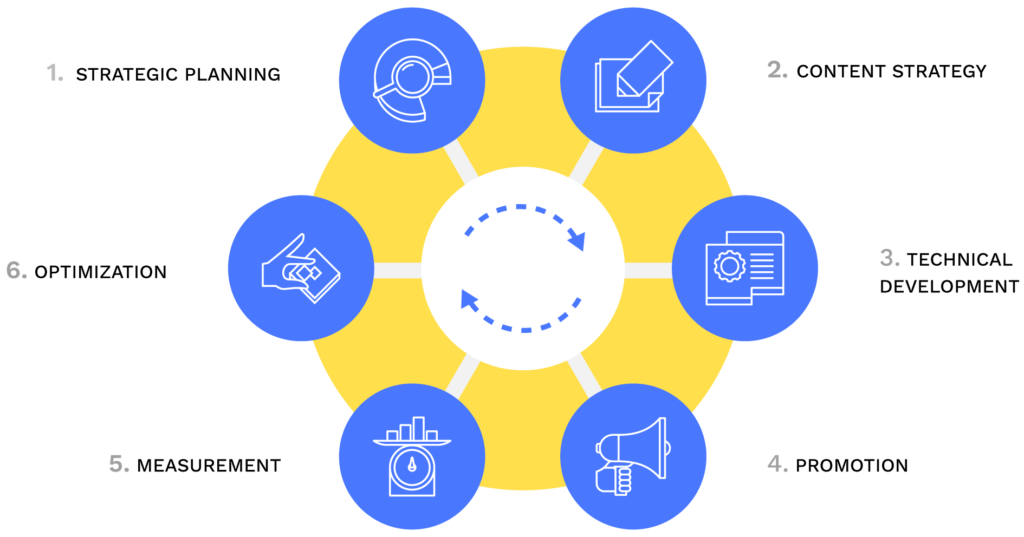
I know I’ve taken up a lot of your time already, so I’ll just focus on what is unique about our approach.
- Strategic Planning – We approach planning similar to a media agency and we include methodologies that we pioneered such as persona-driven keyword research. As early as our kickoff discussion, we are looking to understand what makes your organization tick, who the key stakeholders are, and what are their needs. We look to understand the business objectives, the media mix and look to determine how we fit in. At that point, we build out personas and user journey maps based on the key insights. Our personas then inform our keyword research which then informs competitive intelligence and helps us nail down our strategy.
- Content Strategy – Content is always a sticky issue within an organization because everyone owns it which means no one owns it. It is difficult to get content pushed through at the enterprise level, so it requires that we embed ourselves in the organization to be successful. In other words, we don’t just throw out a few creative ideas, we look to understand existing workflows and governance models within the organization so we can align with them to get content done. We review and internalize brand messaging architecture, audit existing content, and then use all the insights from our strategic planning to inform what content will be created to support the growth of the keyword universe. We also use artificial intelligence to optimize existing content against the statistical expectations that search engines have based on what currently ranks for the target query.
- Technical Development – We engage the engineering teams as early as possible to get a true understanding of the site’s composition. It is our goal to deliver only recommendations that make sense for the technical architecture of the site. From there we dig into the site to identify and prioritize issues and recommendations. When we deliver those recommendations they are explained with context so the various stakeholders can understand what we are doing and why. Once the recommendations are accepted, we convert them into user stories and tickets for execution by the engineering team.
- Promotion – We have various approaches to content promotion, but what is most important at this stage is that we are integrated with the other Paid, Owned, and Earned promotion programs. We integrate with Media to execute SEO efforts that perform in alignment with branded and unbranded media campaigns. This takes shape in the form of Integrated Search programs. We also integrate PR teams to execute scalable link acquisition campaigns.
- Measurement – Since everything we do is persona-driven, our measurement is as well. We work with enterprise brands to configure their analytics to align with their segmentation or the segmentation that we’ve built. In addition, we work with brands to build multi-channel funnels and execute Search Lift studies to determine how the interplay of channels is yielding results.
- Optimization – We continually look to improve our work by surfacing new opportunities on the back of our reports. Where possible we do SEO split testing to validate our recommendations and mitigate the risk of large-scale solutions.
What are some resources to learn more?
There is no shortage of content about SEO. In fact, if you peruse our site, you’ll see plenty of it from several members of the team. Here are a few items that I think may be valuable to build context for a procurement professional.
- Ultimate Guide to Modern Enterprise SEO [EBOOK]
- How to Effectively Onboard an SEO Agency [VIDEO]
- 5 Must-Haves for Your Next Enterprise SEO Agency
- How an Agency Can Help You Strengthen Your In-house Team
- Why SEO Content is Not a Thing [VIDEO]
- How To Prove SEO Performance Value To Non-SEOs [VIDEO]
- Beginner’s Guide to SEO [MOZ]
- How to Rank on Google: 25-Step Master SEO Checklist [MOZ]
And Here’s the Pitch!
I hope this overview helps you understand the lay of the land in the SEO space. If you’re not already considering iPullRank and what they have to offer, we’d love the opportunity to share some of our innovative approaches.
Next Steps
Here are 3 ways iPullRank can help you combine SEO and content to earn visibility for your business and drive revenue:
- Schedule a 30-Minute Strategy Session: Share your biggest SEO and content challenges so we can put together a custom discovery deck after looking through your digital presence. No one-size-fits-all solutions, only tailored advice to grow your business. Schedule your consultation session now.
- Mitigate the AI Overviews’ Potential Impact: How prepared is your SEO strategy for Google’s AI Overviews? Get ahead of potential threats and ensure your site remains competitive with our comprehensive AI Overviews Threat Report. Get your AI Overviews report.
- Enhance Your Content Relevancy with Orbitwise: Not sure if your content is mathematically relevant? Use Orbitwise to test and improve your content’s relevancy, ensuring it ranks for your targeted keywords. Test your content relevance today.
Want more? Visit our Resources Page for access to past webinars, exclusive guides, and insightful blogs crafted by our team of experts.


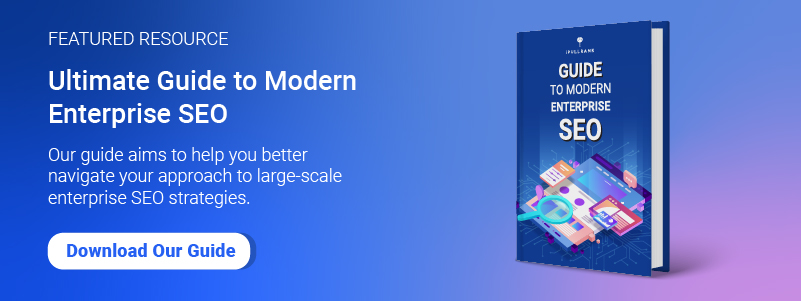
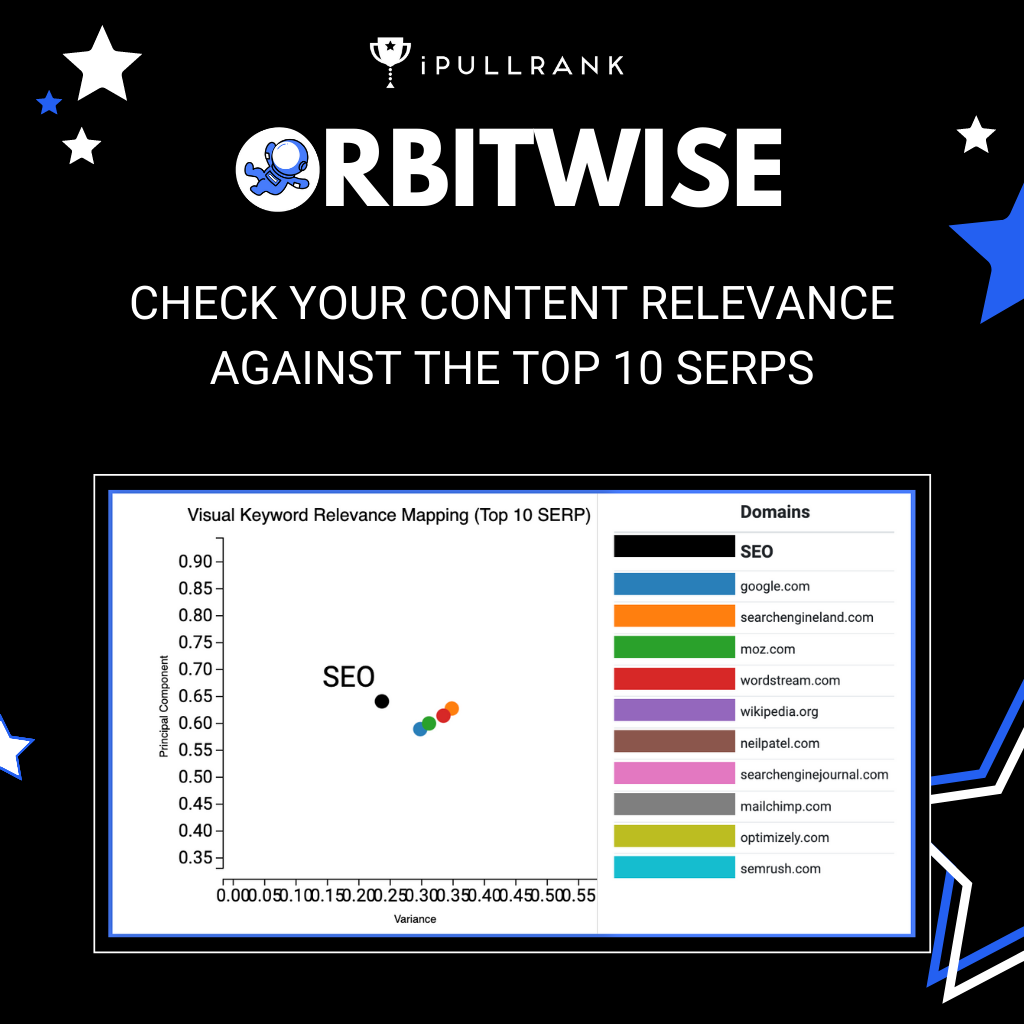
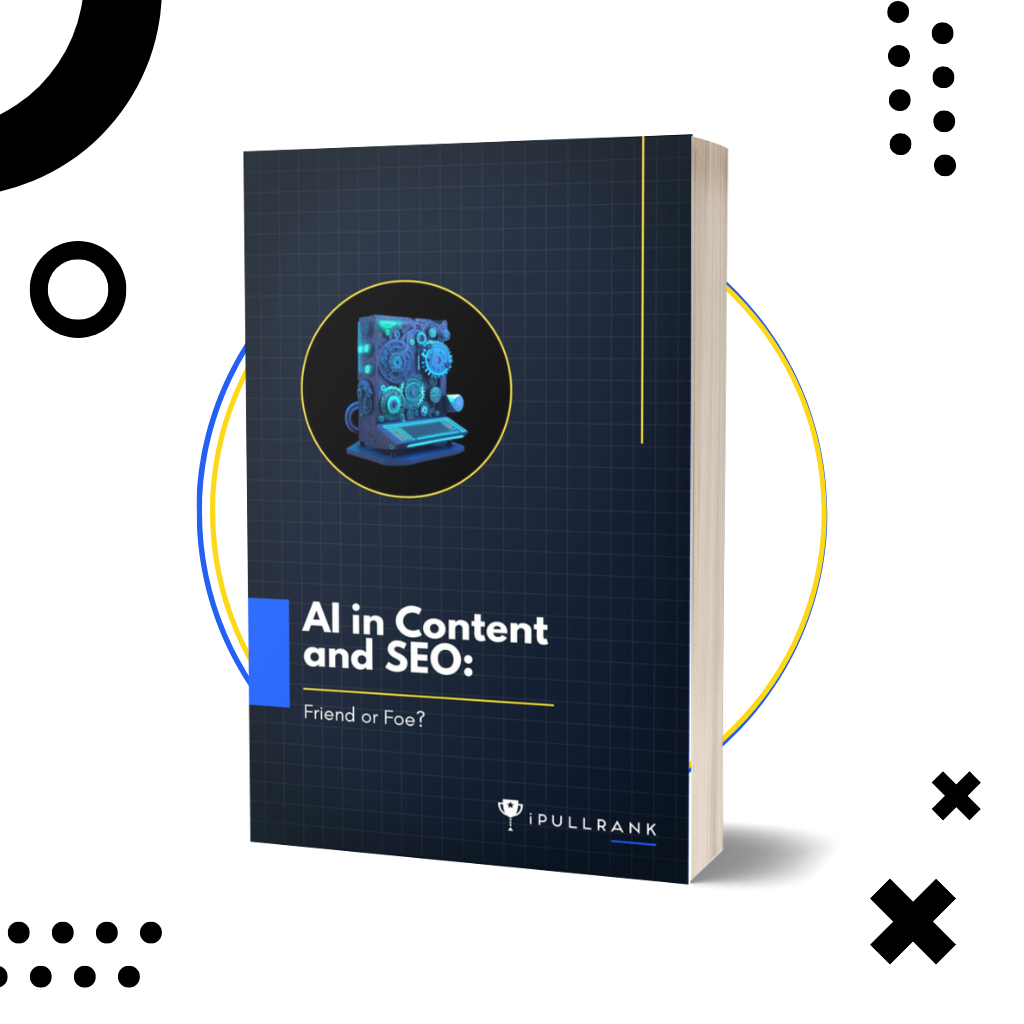
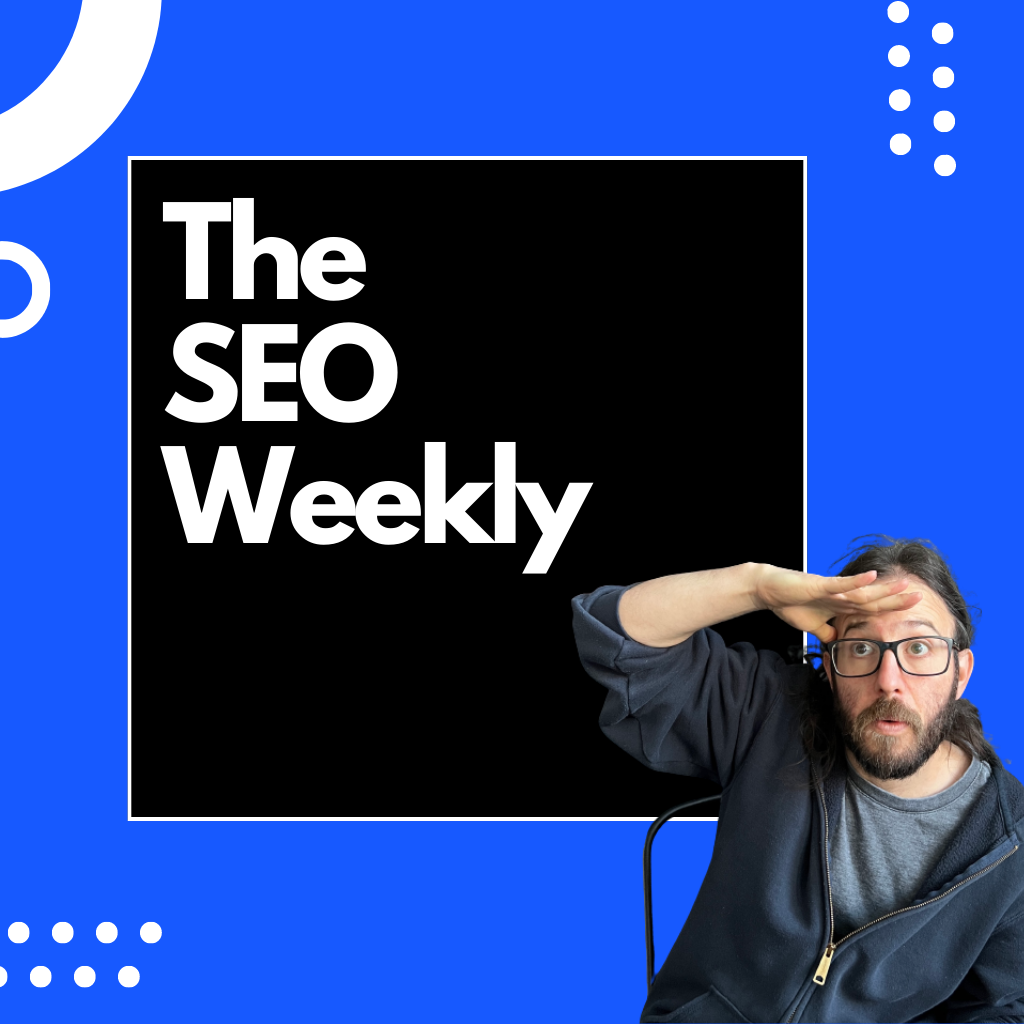
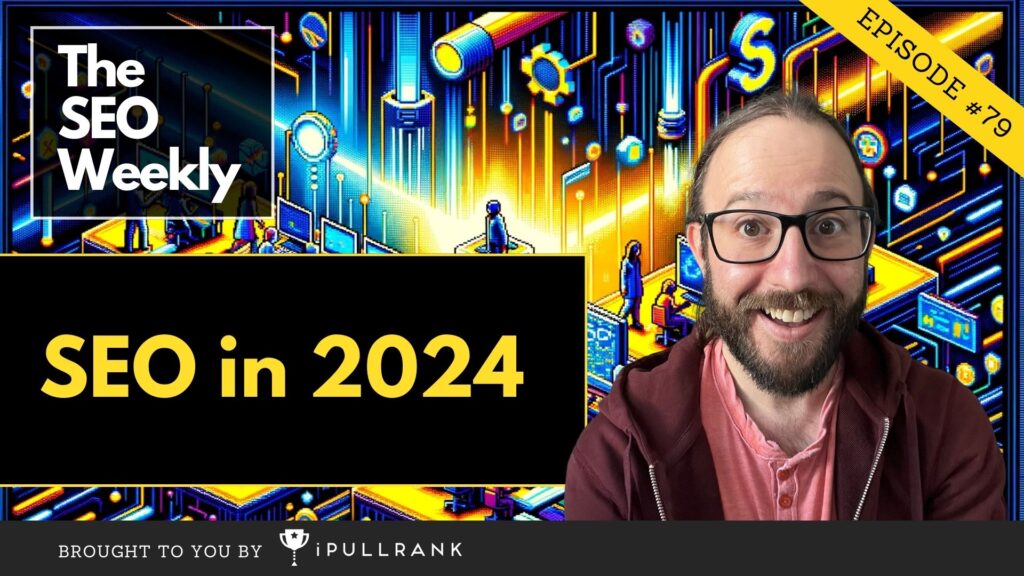
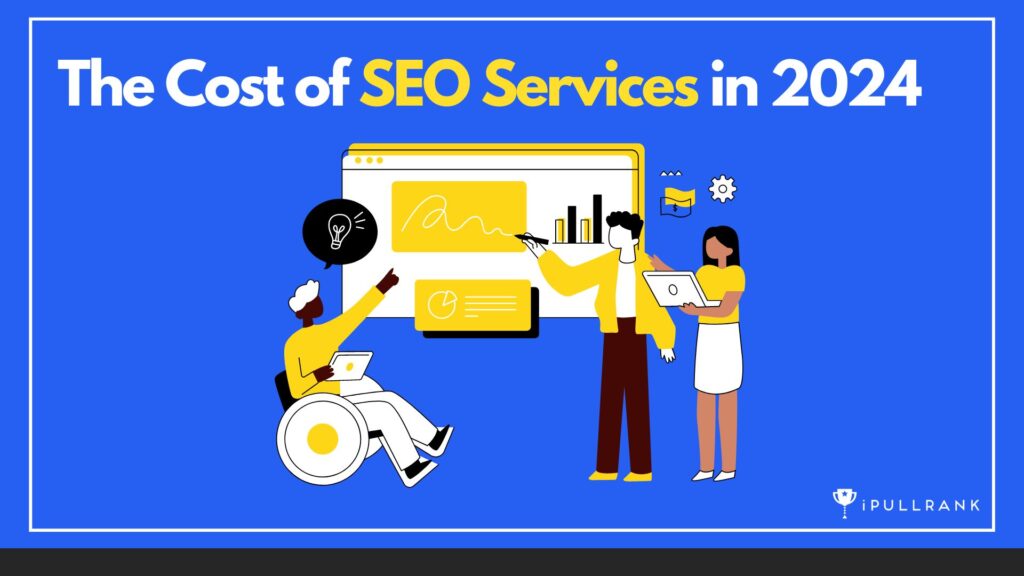
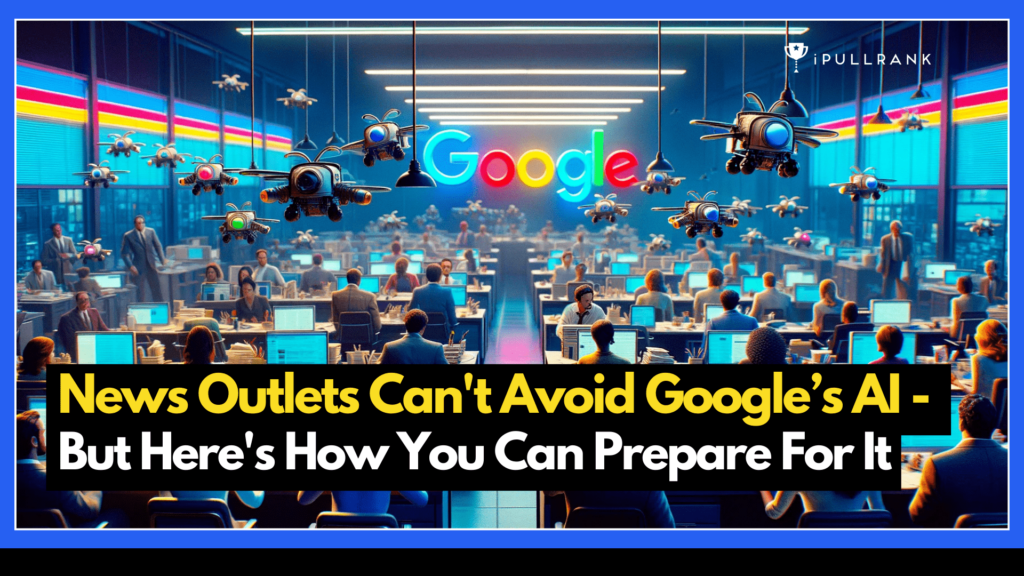


Leave a Comment